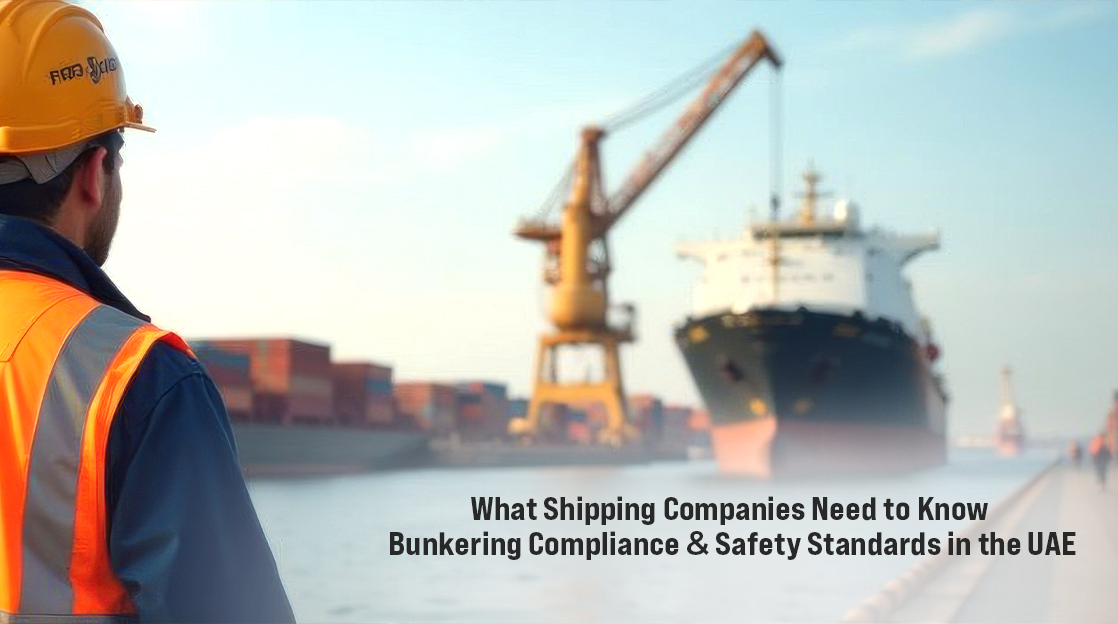
If you’re a bunker fuel provider in Dubai, UAE then you’ve to think more than just about fuel and compliance and safety have become crucial with the tightening regulations and environmental impact. No matter you’re new in this field or you an experienced one, understanding compliance framework and safety expectations is key to avoiding costly delays and maintaining smooth operations.
So, basically shipping companies must aware of the IMO 2020 Sulphur cap, port authority regulations, safety guidelines and environmental guidelines, monitoring systems and more.
In this blog, we can see everything in detail.
What is Bunkering?
In simple terms, bunkering is the process of supplying fuel to ships. More than that it is a complex operation which includes checking fuel quality, safety standards, and environmental standards also to check.
Why Bunkering Compliance is Crucial?
TYCOON provide services in all the UAE several major ports, including Jebel Ali, Mina Rashid, Port Khalifa, and sharjah. Moreover, the bunkering operations must comply with both local regulations and international maritime standards like those set by the International Maritime Organization (IMO).
Failure to meet these compliance standards can lead to fines, port delays, or even blocklisting by authorities, something no shipping company wants.
Now we can see what are the bunkering compliance standards in the UAE
IMO SULPHUR CAP : Since January 2020, the IMO has made it mandatory for ships to use fuel with a sulphur content of no more than 0.50%. This rule has changed how ships refuel worldwide. In the UAE, authorities strictly follow this rule, and companies like TYCOON supply low-sulphur fuel that meets these requirements.
Environmental Regulations: The UAE’s Federal Law No. 24 of 1999 on the Protection and Development of the Environment mandates adherence to specific environmental regulations, particularly regarding fuel quality, emissions, and spill prevention.
Port Authority Guidelines: Port authorities in dubai, and UAE including DMCA and Abu Dhabi Ports, have established specific guidelines for bunkering operations.
Based on DMCA Guidelines they require permit for bunkering operations which includes specific requirements like ensuring sufficient lighting and using rubber floaters to prevent pollution.
Bunkering is prohibited in conditions with waves exceeding two meters or wind speeds above 25 knots
Abu Dhabi Ports has detailed “Port Rules” that outline practices for port users, emphasizing safety, environmental protection, and security.
Guidelines emphasize preventing oil spills and pollution, with measures like using floaters and reporting any incidents.
Adherence to these guidelines is crucial for safe and efficient bunkering operations in Dubai and Abu Dhabi.
Safety is the major component of every operation. Now we can see few safety practices shipping companies must follow in the UAE.
Pre-Bunkering Checklists – Before starting fuel transfer, both the fuel supplier and the ship must complete a checklist to confirm communication, hose connections, and emergency steps are ready.
Emergency Response Plans – Ships must have clear written procedures for dealing with fuel spills, fires, or equipment failures. UAE ports may also ask for crew drills or proof of training.
Monitoring Systems – During refuelling, fuel flow, temperature, and pressure must be tracked in real time. Automated systems help spot problems early and prevent accidents.
Here’re some of the questions can most of the shipping companies have
Can bunkering be done while cargo operations are ongoing?
Yes, bunkering can be carried out while cargo operations are ongoing in UAE ports, but only under strict conditions set by each port authority. It needs prior approval, risk controls, etc. Connect with the leading ship bunkering company in Dubai, UAE to know more in detail.
Is bunkering allowed at all UAE ports?
Yes, but each port has its requirements. Working with an established supplier like TYCOON ensures you’re covered across all major UAE ports with streamlined operations and compliance support.
What are the common causes of delays in bunkering?
Which includes several reasons like late arrival of bunker truck, port clearance delays, safety issues, and more. At TYCOON, we ensure that no delays happen from our end from beginning to end.
With our expertise and knowledge in the market, Tycoon sources cargo from refineries, established traders and other oil producers. Work round the clock and across geographical locations to cater to bunker requirements of worldwide vessel owners, operators and charterers. Tycoon trading ensures the supply of all types of marine fuel oil, gasoil across all over UAE ports.